[Home]
[Main]
[Prev]
June 14, 2022 - Return to George Lake
Alpine start today as we had seventeen kilometers to hike followed by a seven hour drive back home. We hit the trail
at at 06:15. More quartizite ridge walking for the main portion of the day, with occasional stops at outlooks for
short breaks. During lunchtime we took a longer break on top of a geological feature called The Crack, and started to
meet the first day hikers of the trip. The descent through The Crack was quite interesting and challenging enough
that some of the day hikers turned back before climbing it to the amazing views on top.
Calm morning on Bunnyrabbit Lake
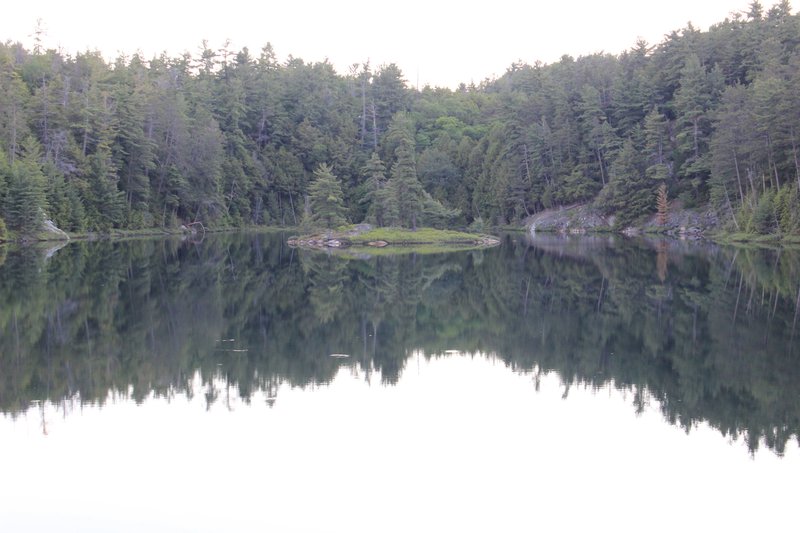
Yoga on a lookout
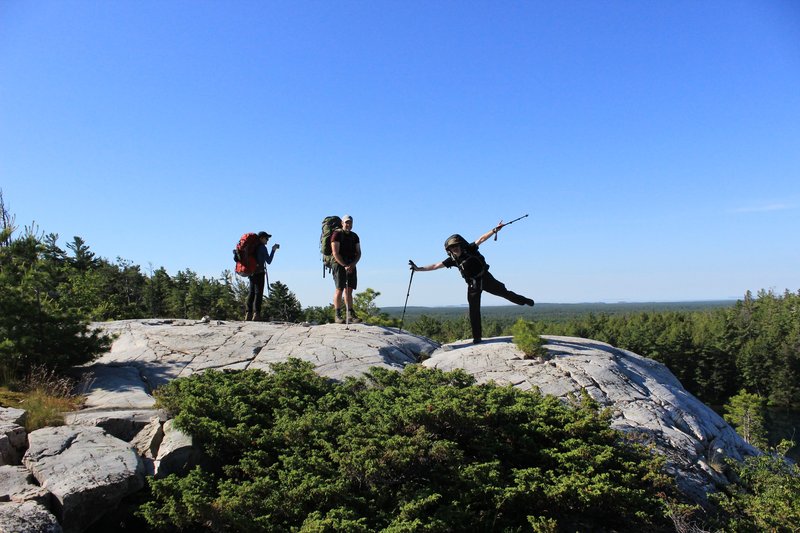
Little Superior Lake
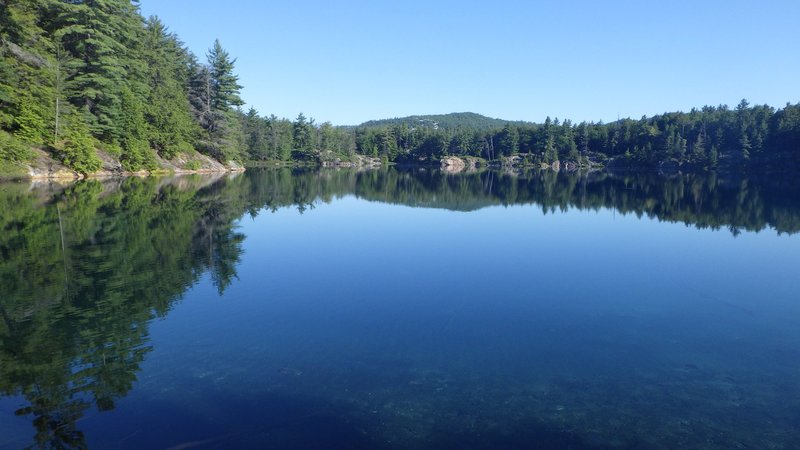
Approaching the Crack
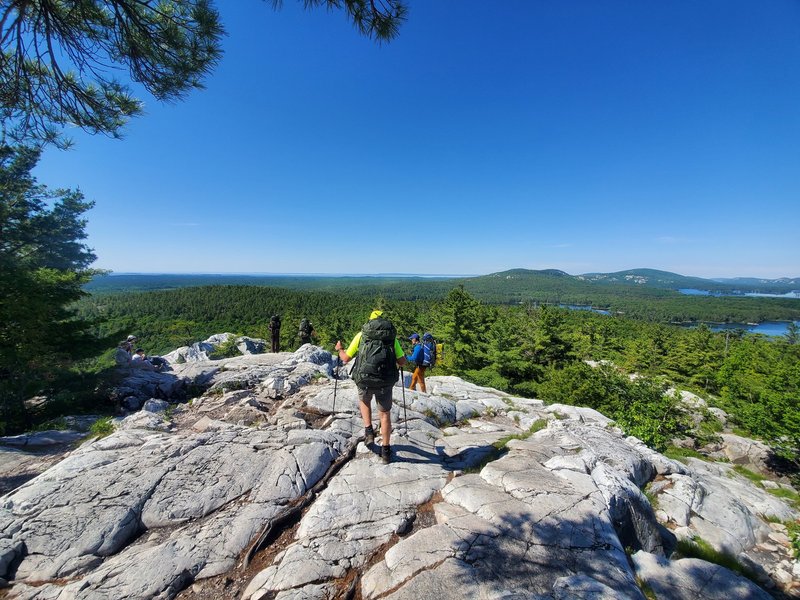
And he revealed to the angels the place where he was hiding... when the unholy son of Kron discovered this, his rage cracked the Earth!
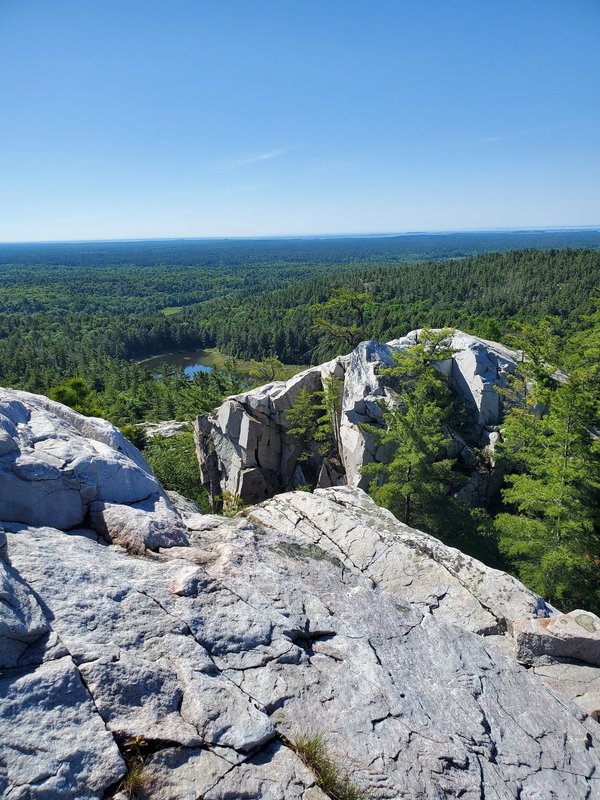
Passing through the Crack

As we passed by Kidney lake we got lost in a maze of herd paths in the woods and ended up bushwhacking for a bit to
get back onto the main trail where we encountered a sign indicating that the trail had been re-routed due to
environmental degradation. I think a bit better trail marking here around the herd path area would be much more effective
at keeping everyone on the path if that is the intention!
We were out of water, so we spent a little while on the shore of Kakakise Lake refilling bottles as Paul W and I dove
in for a quick swim. From here back, the next six kilometers were fairly flat and went by as a blur. Somewhat blurred
because of the monotony of walking through a tree tunnel after the last few days of spectacular ridge walking, and more blurred
as we all hustled to keep up with the stiff pace that Melanie was setting from the front. As we approached George Lake,
the trail climbed again and we got a last few viewpoints before being deposited in the campground for a kilometer slog
back to the car along the roadway.
Beaver dam crossing

Final lookouts as we approach George Lake

Hike through George Lake campground
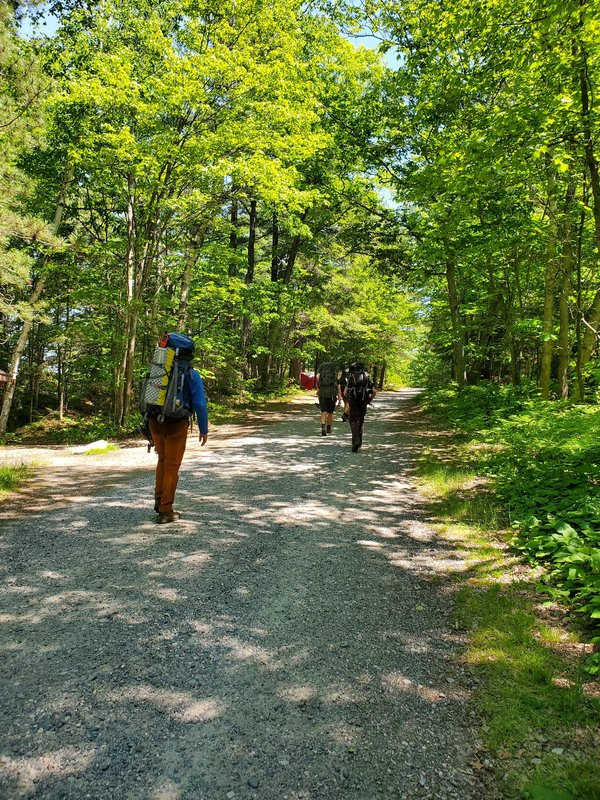
We all took a shower at the comfort station before driving into Killarney town for fish and chips before taking the long
drive home.
Epiogue
Simon was flown to the hospital in Sudbury and diagnosed with spiral fractures of both the tibia and fibia bones in his lower leg. He underwent surgery and
was released after a few days. I am still surprised that such a serious accident could happen on such benign terrain. Basically he slipped a bit on a wet rock and
snapped the leg in a twisting motion as the foot suddenly stopped when encountering a high friction zone. Both Pauls, as well as Simon himself claim to have heard the bones crack
as he fell. His heavy, unbalanced pack likely contributed to the outcome.
I learned some interesting things in this incident. I never imagined that a lower leg fracture would be so painful to essentially completely incapacitate the victim. Even after
stabilizing the injury with the splint, Simon
absolutely refused to be moved from the uncomfortable position he was in. We prepared a much better site for him to lie down, less than one meter away, even planning how
we could move him without his help. Instead he remained twisted on his side where he fell (his choice). This worked because we were only there for a few hours. Had we spent the
night, we would have needed to get him into shelter on flat ground, which would have been difficult. I always thought that the victim would be able to crawl/drag themselves
around using three good limbs. Not the case here. A scary thought, especially if this happened on a solo expedition.
A few things about the emergency response are worth commenting on. We were of course very greatful for the help received,
and the professionals involved were excellent at what they were doing. It was just that the response was more suited to say a bad motor vehicle accident than a back country,
non-life threatening injury. Having two helicopters buzzing around for about probably two hours was probably not the most cost effective rescue scenario. We were about 600 meters
from a lake suitable for float plane access, and 3.5 km from a location with motor boat access (both accessed via good trail).
A park ranger (with detailed knowledge of Kilarrney Park) inserted into one of those two
places could have probably been on scene fairly quickly and located us. With a litter on scene, a carry could have been arranged, easily down to the lake, and with more
difficulty, but not an impossibility out to Georgian Bay. Perhaps there are no rangers assigned to Killarney Park? Then again, the paramedics on scene with their well
stocked pharmacy kit certainly was a bonus and extreme help in getting the patient doped up enough to allow us to move him. The paramedics indicated that they were
called into the park
for a back country rescue every two weeks or so during the season. If this is the case, would it not be a good investment to have some trained park rangers on staff?
On locating us in the first place. I am fairly certain the park was not involved at all, because we initially gave the simplest directions to our position;
"We are at
about halfway between campsites H8 and H16 on the La Cloche trail". This would mean a lot to anyone familiar to the park. We could have even refined this to
"the height of land along this stretch of trail". Either way, there was at most a 2.5 km section of well marked trail
here that anybody on the ground could easily trace to find us. The 911 operator could not deal with grid coordinates. Instead they wanted something called "What Three Words",
even trying to get us to download an app using one bar of service (not going to happen). Eventually we settled on lat/long coordinates, probably requested by one of the pilots.
Note to other back-country enthusiasists. Download the "What Three Word" app onto your phone before you go.
Some thoughts about satellite communicators. As mentioned before, we set one of these off. I would have thought the
location provided by this device would also have assisted the search for
us (and perhaps it did), but in retrospect, given that we were able to get through to 911, it probably would have been better not to set this device off at all. This
also notified people back
home that we were in trouble, which coupled with incomplete information, probably caused more stress to them than necessary. We really did not need any assistance from people in
Ottawa and it would have been better to deal with the situation locally and tell the story over a beer once back in the front-country.
That being said, had we not had the cellular service, the satellite beacon would have been invaluable.
The End
[Home]
[Main]
[Prev]








